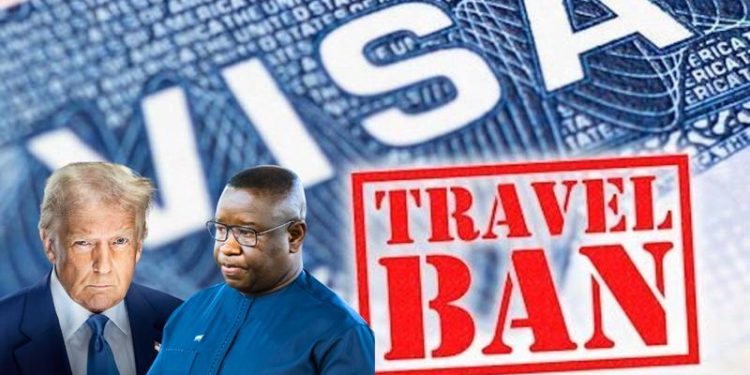By Hassan Osman Kargbo
The United States Embassy in Freetown has announced the suspension of several categories of non-immigrant visa issuance to nationals of Sierra Leone, effective Monday, June 9, 2025. The move follows a Presidential proclamation recently issued by the White House and marks a significant shift in U.S. immigration policy towards the West African nation.
According to an official statement from the Embassy, the affected visa categories include tourist (B), business (B), student (F, M), and exchange visitor (J) non-immigrant visas. The suspension means that Sierra Leonean nationals seeking to travel to the United States for purposes such as vacation, attending business meetings, enrolling in academic institutions, or participating in cultural exchange programs will not be issued new visas under these classifications until further notice.
This decision represents a substantial barrier for thousands of Sierra Leoneans who regularly travel to the U.S. for education, tourism, or professional development. The news has sparked concern across sectors including higher education, international business, and civil society organizations with longstanding U.S. partnerships.
However, the Embassy provided some important clarifications. The suspension does not apply to immigrant visas issued to certain close family members of U.S. citizens. Specifically, the policy exempts visa categories for spouses (IR-1 and CR-1), children (IR-2 and CR-2), parents (IR-5), and adopted children (IR-3, IR-4, IH-3, and IH-4). This means that Sierra Leonean nationals applying under these immigrant classifications will continue to have their visa applications processed.
Additionally, the U.S. Embassy emphasized that the new proclamation does not revoke existing visas. Sierra Leoneans who already hold valid U.S. visas are still permitted to travel and enter the United States, provided they meet all immigration conditions at the port of entry. However, embassy officials warned that strict compliance with visa regulations will be more important than ever.
“We strongly encourage all travellers to use their visa as intended,” the statement read, “and to comply with all U.S. immigration regulations to avoid jeopardizing future travel opportunities.” The Embassy specifically cautioned against overstaying visas or working without authorization, noting that such violations could result in visa cancellations, deportations, or future bans on entry.
While no official reason was provided in the Embassy’s statement regarding the motive behind the presidential proclamation, policy analysts suggest the decision could be linked to issues such as immigration enforcement cooperation or overstay rates. Historically, proclamations of this nature are often employed by the U.S. government as diplomatic tools to encourage compliance with international agreements or improve data-sharing on migration matters.
Reactions in Sierra Leone have been mixed. While some view the suspension as a wake-up call for the government to improve engagement with U.S. immigration policies, others fear it could have ripple effects on the country’s education system and workforce development. For many young Sierra Leoneans, studying in the United States remains a key pathway to advanced education and career opportunities.
“I had just started the process to apply for a student visa for the fall semester,” said Mariama Bangura, a prospective undergraduate student who had been admitted to a university in the Midwest. “Now I’m not sure what will happen. It’s devastating.”
Business leaders have also raised concerns about the impact on international trade and investment ties. The B1 visa category, commonly used by professionals attending conferences or negotiating contracts in the U.S., plays a crucial role in cross-border economic activity. The pause could result in delayed projects and strained business relationships, some warn.
Despite the restrictions, the Embassy reiterated its commitment to the people of Sierra Leone and pledged to provide updates as the situation evolves. For now, affected individuals are advised to monitor the U.S. Embassy website and official communication channels for the latest information.
As the implications of this suspension continue to unfold, many in Sierra Leone and the diaspora are left to navigate uncertainty—balancing hopes for opportunity abroad with the pressing need to comply with an evolving and often complex immigration landscape.










